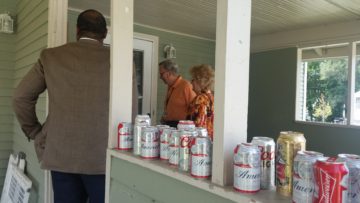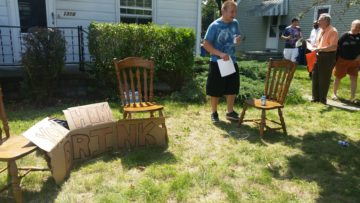By JAN LARSON McLAUGHLIN
BG Independent News
Still in her pajama shorts at 1:30 Friday afternoon, Lacy Hoening wasn’t expecting the mayor and university president to come knocking on her front door.
“I saw you coming down the street and said, ‘the president’s coming,’” Hoening said as she welcomed to her front porch BGSU President Mary Ellen Mazey, Mayor Dick Edwards and Vice President of Student Affairs and Vice Provost Thomas Gibson.
“We just want everyone to be on their good behavior,” Mazey told Hoening. They chatted about classes and hometowns, shared hugs and handshakes.
One house down, many more to go.
The door-to-door visits by the mayor, university president and vice provost were not just to welcome new students. They were to establish some expectations – especially for those students living on East Wooster Street, the front door to the city.
“When I first came to BG, there were signs put up,” Mazey recalled. While some students found them funny, many parents dropping out their students for the new school year failed to find the humor.
One huge sign stated, “Daddy drop your daughters off here. They’ll be in good hands.”

Beer cans line porch where mayor and BGSU leaders visited.
“That’s not something we want to be known for,” Mazey said.
So she and the mayor teamed up and started their annual meet and greets along Wooster Street.
“The last two years, it’s really improved,” Mazey said. “I think it’s helped.”
On Friday afternoon, they put on their walking shoes again and went knocking on doors.
After chatting with Hoening, they tried the next house, noticeably different than Hoening’s. The front yard was littered with alcohol bottles and beer bongs. No one answered the knock on that door, and the officials joked about having better luck finding someone awake at 1:30 in the morning than 1:30 in the afternoon.
The officials came across two signs along the route. One read “Honk 4 Harambe.” For those who have forgotten, that’s the gorilla killed at the Cincinnati Zoo after a young boy entered his enclosure. BGSU student Josh Mahan said he and his roommates wanted to post a funny, but harmless sign.
Down the street was a cardboard sign stating, “You honk, we drink.” Two students, who preferred not to give their names, were already outside in the middle of the afternoon, accommodating motorists who laid on their horns.
“People always honk,” said one of the men as he tilted back a beer.
“You need to put the best face on BGSU,” Mazey said to the students. “You need to set a good example.”
When the mayor and Mazey moved on to the next house, the students said they would remove the sign if asked, but defended it as a “tradition.”
“It’s a friendly hello. Like a welcome,” one said, waiting for the next honk.

Students posted “You honk, we drink” sign in front yard.
At another house, students were stretching out a sheet of plastic for a homemade “slip ‘n’ slide.” Edwards asked the students how they were planning to anchor the plastic, bridging any generation gap that might have existed between the mayor and college students. “Come over with your suit later,” one of the guys said, inviting the mayor to try the water slide.
“Have fun, and be on great behavior,” Mazey said as they left that yard.
A couple young women answered another door on the street. “It’s kind of funny, you don’t expect that to happen,” Makenzie Wheat said after the local dignitaries left for the next house.
“She’s connecting with the students,” Lauren Schmenk said. “At bigger universities, you don’t even know the president.”
Another home was set up for festivities, with bags of hamburger buns stacked up on a table in the front yard. “Save me a burger,” Gibson said, after giving the pitch about good behavior.
Then they came to the “problem house” at 1014 E. Wooster St. The rental still had remnants of its last party, including broken glass throughout the yard. No one answered knocks on the doors.
“This is an infamous house,” Edwards said. “We’ve tried to do all kinds of things.”
As they walked on, Gibson, who has been at BGSU for just a few weeks, shared an idea that would address the problem from a different angle. He suggested that a “preferred housing list” be compiled, similar to those created by other universities.
The list could be like a “product review” by renters, and would let students and their families know which homes to avoid.
“It would encourage some of these other landlords to get on board,” Gibson said.

